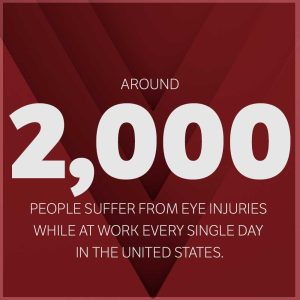
Eye injuries at work can leave you with serious disabilities and expensive medical bills. While these injuries are more common for welders, construction workers, and other occupations that involve physical labor, numerous work environments can harm a person’s eyesight, including office work. Prolonged exposure to electronic devices, such as computers and smartphones, can damage your eyes.

Sadly, eye injuries at work happen frequently. According to the Centers for Disease Control and Prevention (CDC), around 2,000 people suffer from eye injuries while at work every single day in the United States. That’s around 720,000 injured U.S. workers every year!
While recovering workers’ compensation for an eye injury should be an easy process, many Kentucky workers struggle to regain the money they’re owed for their medical bills and lost wages. If you’re struggling to receive the full compensation you deserve, you need to contact a Kentucky workers’ compensation attorney to assist you.
Types of Eye Injuries
Many different workplace hazards have the potential to damage an employee’s eyesight, such as:
- Harmful particles in the air, including metal
- Flying or falling objects and debris
- Chemicals and irritants
- Physical trauma from machinery and other equipment
- High-intensity light and radiation
- Biological hazards
- Prolonged computer use

These many hazards have the potential to cause serious damage to your eyes. Some common types of work-related eye injuries include:
- Corneal abrasions
- Chemical burns
- Thermal injuries
- Eye strain and fatigue
- Eye infections and diseases
- Eye bleeding
- Ocular penetrating and perforating injuries
- Eye swelling
- Detached retina injuries
- Contusions and bruises
- Eyelid lacerations
- Hyphema, anterior chamber bleeding
- Photokeratitis, inflammation of the cornea caused by ultraviolet radiation
If you’ve suffered from any one of these injuries and incurred medical bills as a result, you can file a workers’ compensation claim to recoup the money you lost.
Who Qualifies for Compensation After an Eye Injury at Work?
In Kentucky, employers must provide their employees with workers’ compensation coverage. That said, not everyone who works in our state is technically considered an employee, and some exceptions prevent certain workers from recovering compensation.
To be considered an employee in Kentucky, you need to be one of the following:
- Someone working under a contract for hire
- An executive officer at a business
- A volunteer firefighter
- A state, city, or federal employee
- A person completing services in a trade profession or business
- Someone who sells or delivers newspapers
It’s critical to note that Kentucky has exceptions that may prevent certain workers from recovering money after an injury. These exceptions include:
- Agriculture workers
- Some charitable, volunteer, and religious organization workers
- Employees who are already protected by the Federal Act, including those working on military bases and postal employees
- In-home domestic employees who work less than 40 hours a week
Eye Injury at Work Compensation
Once you file a workers’ compensation claim, you may receive different types of benefits that will depend on the unique circumstances surrounding your injury. There are two primary types of workers’ compensation benefits in Kentucky:
Medical Benefits
Injured employees should receive compensation for all medical expenses related to their injuries. This includes all doctors’ visits, prescriptions, diagnostic imaging services, surgeries, ongoing care, and medical devices.
Additionally, you should recoup compensation for any travel expenses you incurred to receive medical treatment. For example, if you need to travel to another city for surgery, you should keep all travel receipts so that you’re reimbursed.
Wage Replacement Benefits
Your wage replacement benefits will depend on the money you lost because of your work injury. Rather than providing you with your full pre-injury wages, your benefits will likely be 66% of your average weekly earnings.
Further, your benefits will be considered either temporary or permanent depending on whether you’re expected to recover from your disability. The three types of wage replacement benefits in Kentucky are:
- Temporary Total Disability (TTD): These benefits are for workers who are temporarily out of work due to their injuries. Employees receive these benefits until they’re able to resume working or until they reach their maximum medical improvement (MMI), meaning they’re not expected to substantially recover further. After reaching MMI, they should qualify for either Permanent Partial Disability or Permanent Total Disability.
- Permanent Partial Disability (PPD): An employee can recover PPD benefits if they’re able to continue working part-time after their injury. The PPD is meant to help support them because they can no longer work full-time. An employee can receive these benefits for either 425 or 520 weeks, which will depend on the severity of their impairment.
- Permanent Total Disability (PTD): PTD benefits compensate employees who are permanently disabled and unable to work. Employees can receive these benefits until they reach the age of 70.
While employees will generally receive 66% of their pre-injury earnings, they may be able to recover more compensation if they suffer from permanent vision loss as a result of their workplace injury.
Additionally, you may qualify for vocational rehabilitation if you’re unable to return to your pre-injury career but can continue working.
Contact a Kentucky Workers’ Compensation Attorney
If you suffered from a workplace injury and are struggling to recover money for medical bills or lost wages, you need to contact a law firm that specializes in workers’ compensation claims.
For experienced Kentucky workers’ compensation lawyers, contact McCoy & Sparks Attorneys at Law. You can schedule a free, no-risk case consultation today by calling 844-459-9467 or you can make your appointment online here.

